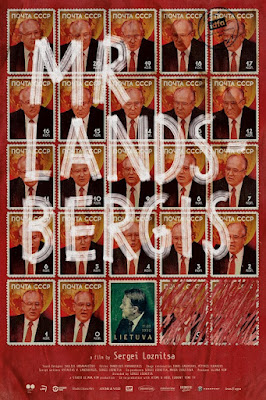He ought to be considered on par with towering freedom fighters of the 20th Century, like Lech Walesa and Vaclav Havel. Yet, Vytautas Landsbergis is somewhat overlooked by contemporary historians, even though his leadership helped guide Lithuania through its tumultuous drive for independence. Archival filmmaker Sergei Loznitsa puts Landsbergis front-and-center, revisiting the history of Lithuania from 1988 to 1991 through primary archival sources in Mr. Landsbergis, which screens at MOMI during this year’s First Look.
As in previous films, Loznitsa scoured state and media archives, cobbling together footage that captured history unfolding in real-time. However, he also incorporates extensive interview footage with Landsbergis, who provides context and commentary throughout. This greatly helps the film’s watchable, fully establishing the stakes at play and deepening the emotional connection to the viewers. In some cases, Loznitsa’s culled together films are important, but exhausting to sit through (The Trial for instance), but that is not an issue for Mr. Landsbergis.
In fact, it is quite a gripping film—all four-plus hours of it. Western media reports were a bit confused at the time, so many viewers might be surprised by the extent and violent severity of Gorbachev’s response to Lithuania’s declaration of independence. Columns of tanks rolled through Lithuanian streets. Shots were fired and people died. Indeed, in many ways, Loznitsa’s film serves as a sharp rebuke to Gorbachev and those who try to cast him as transformative figure. Instead, Landsbergis bluntly suggests he was the same as his predecessors, only more media savvy.
Landsbergis often identifies points when history could have gone in the other direction. However, the Lithuanian people held firm in the face of Soviet intimidation, consciously risking death to hold the line. Indeed, viewers can see parallels between the “Bloody Sunday” events of January 13 in Lithuania and the war crimes Russia is now committing in Ukraine, especially the defense that they are all the victims’ fault, because they didn’t surrender.
Despite leading Lithuania at such a critical juncture, Landsbergis was never elected president. Still, he served his country in the Lithuanian and European parliaments. He is a leading advocate for efforts to fully investigate and memorialize the crimes of Communism, which might be why he has not had a higher profile with the international media.
That is why Loznitsa’s documentary is so valuable. It is a comprehensive and uncompromising chronicle of exactly what happened, with insight from Landsbergis. Consider it the definitive documentary on the subject. Very highly recommended, Mr. Landsbergis screens Saturday (3/19), as part of First Look 2022.

